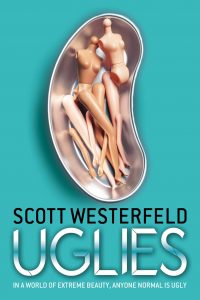
I read Uglies by Scott Westerfeld when I was twelve years old, and it was the first time I was introduced to the idea of pretty privilege. My 12-year-old self understood that beautiful people were more likely to attain fame or celebrity status, but Westerfeld’s critique of our society was jarring. Uglies is the first book in a trilogy of novels about sixteen-year-old Tally Youngblood. In Tally’s world, once you turn 16, you undergo a total-body cosmetic operation that makes you “pretty.” Facial features are carved and filled until perfectly symmetrical, eyes enlarged, lips plumped, legs elongated, abs carved. In Tally’s post-apocalyptic world, the procedure functioned as the ultimate mechanism for equality. The public are taught that all conflict arises from people looking different. Students learn how “the Rusties”, the term used to describe our contemporary society, were a divided society because they had varying perceptions of beauty. “The Rusties” were flawed because “everyone judged everyone else based on the appearance. People who were taller got better jobs, and people even voted for some politicians just because they weren’t quite as ugly as everyone else… people killed one another over stuff like having different skin color”(Westerfeld 44). In Tally’s world, this deep understanding of pretty privilege justified the operation as “the only way to make people equal” (Westerfeld 44).
Uglies is brilliant because it creates a world in which pretty privilege is so explicit even a twelve-year old can understand it. By constructing a future, dystopian world, Westerfeld allows young readers to think critically about what role beauty and appearance has real world. In the book, the post-op “pretty” young adults spend the rest of their lives intoxicated and work free. They live in mansions and have their every need catered to them by machines and robots. The “uglies,” who haven’t had the operation yet, live a very different life. They are required to attend school, live in mundane dormitories, and are outcasts of society. In Tally’s world, “uglies” are not allowed in “pretty” spaces and this segregation is strongly policed. There is a community of outcasts who refuse the operation, but that is just what they are, outcasts. These “uglies” are forced to live deep in the woods beyond the city limits with no access to any of the luxuries and technologies that the city has to offer. The correlation between appearance and a life of luxury is made explicit in the book, making pretty privilege abundantly clear for young readers.
Westerfeld also introduces teens to other societal qualms that revolve around perceptions of beauty, issues that teens may not be aware of or have yet to experience. As I read this nine years ago, I began to critically think about our obsession with beauty and body modification. The “pretty” operation in the book made me critically think about popular cosmetic surgeries and just how invasive and serious these “normal” procedures are. Uglies also introduced male and female negative body image. I was able to see similarities between the negative comments I would make about myself and the self-deprecation by the “uglies” in the book. The exaggerated perceptions of beauty in the book made me sympathize with the “uglies” for being average looking, allowing me to be more forgiving towards myself as well.
While these representations and revelations were so important to my adolescence, it wasn’t until later in life that I noticed how the novel only focuses on Western beauty ideals. While I understand that these Western beauty ideals were often the cite of critique within the book, the only time a non-Western beauty ideal was mentioned, it was presented as foreign and dangerous. While I began to understand the concept of pretty privilege and the dangers of a narrow definition of beauty, Western beauty was the only definition presented to me. While the race of characters was not explicitly stated, the descriptions given create the image of exclusively white characters. At twelve-years-old, when I would go to school, I would see white kids get all the attention while non-white kids were cast aside. So when the descriptions of procedures and transformations all aligned themselves with a Western, white body, Uglies only solidified my understanding of white bodies as desirable and superior. I internalized that Western beauty ideals were rewarded with privilege. Teen novels are always didactic, so representations are extremely significant. The absence of non-white representations of beauty directly influences and informs the perceptions and beliefs of the young-adult reader!
While Uglies explicitly and implicitly forces readers to acknowledge faults in our perceptions of beauty, does it dismantle these expectations? My twelve-year-old self was made aware of pretty privilege, but that was it. I became more critical of how we value beauty and use it as a form of social and economic capital, but Westerfeld fails to provide teens with the tools or practical advice about how to navigate our appearance-driven society. According to the book, I must flee civilization and live off the land in order to handle societal expectations and pressures. Don’t get me wrong, I am not condemning this book to the trash bin! Quite the opposite actually! I encourage young adults to read this book because it provides a wonderful introduction to sociological imagination, societal short comings, and pretty privilege. Uglies allowed me to discern how young people are introduced and experience pretty privilege. At twelve-years-old, I experienced the exclusion of “uglies” from fun and events, and Westerfeld’s dystopian world reflects those adolescent experiences making it a wonderful tool for understanding these complex social critiques. But given the wealth of teen novels that now exist, Uglies does not provide the diverse representations and practical solutions that teens need.
Sources:
Mock, Janet. “Being Pretty Is a Privilege, But We Refuse to Acknowledge It.” Allure, 28 June 2017, www.allure.com/story/pretty-privilege.
Westerfeld, Scott. Uglies. ser. 1, Simon Pulse, 2005.
Williams, Ray. “Do Good Looks (Beauty) Give You an Advantage?” Primum Non Nocere: First Do No Harm, 16 Oct. 2018, raywilliams.ca/good-looks-beauty-give-advantage/.